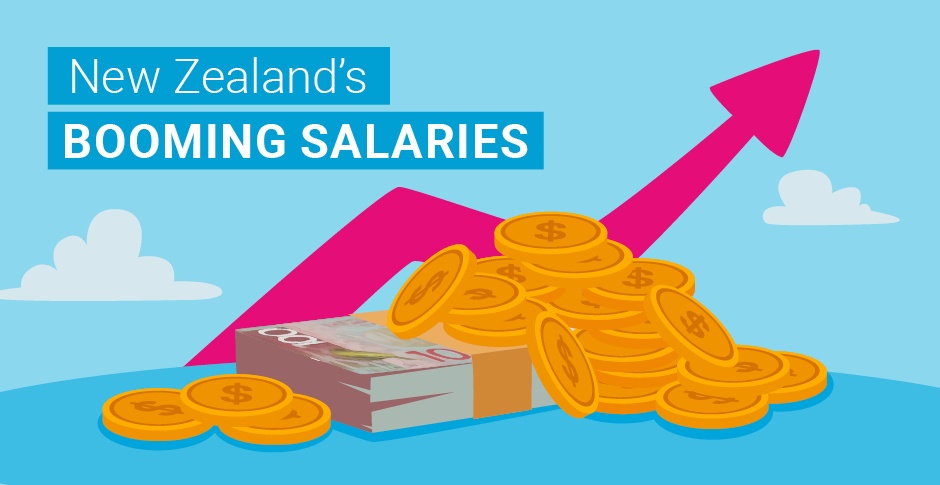Demand for talent is growing across New Zealand – and employers are digging deeper to attract the very best. Data from SEEK shows job ad volumes continue to grow and many in-demand roles have seen a rise in salary compared to pre-COVID.
What does this mean for your next career move? The below table shows jobs that have seen a rise in salary, paired with significantly more job ads yet not enough people applying. This means not only is there considerably less competition for these jobs, they’re also offering job seekers a higher salary than they were before COVID.

| INDUSTRY | ROLE | JOB AD GROWTH |
AVERAGE SALARY |
|---|---|---|---|
| Community Services & Development | Social Worker | 99% | $72,451 |
| Healthcare & Medical | Registered Nurse | 109% | $59,308 |
| Healthcare & Medical | Pharmacist | 207% | $73,321 |
| Hospitality & Tourism | Chef | 53% | $46,378 |
| Hospitality & Tourism | Chef de Partie | 31% | $45,637 |
| Hospitality & Tourism | Head Chef | 27% | $66,005 |
| Hospitality & Tourism | Duty Manager | 42% | $45,827 |
| Hospitality & Tourism | Restaurant Manager | 52% | $55,198 |
| Information & Communication Technology | Business Analyst | 33% | $107,219 |
| Information & Communication Technology | Full Stack Developer | 49% | $103,821 |
| Information & Communication Technology | Software Developer | 105% | $97,322 |
| Information & Communication Technology | Developer | 3% | $101,903 |
| Information & Communication Technology | Java Developer | 5% | $112,730 |
| Information & Communication Technology | Software Engineer | 141% | $105,242 |
| Information & Communication Technology | Systems Engineer | 52% | $95,971 |
| Manufacturing, Transport & Logistics | Machine Operator | 30% | $45,659 |
| Manufacturing, Transport & Logistics | Operations Manager | 36% | $104,529 |
| Manufacturing, Transport & Logistics | Storeperson | 56% | $44,261 |
| Manufacturing, Transport & Logistics | Warehouse Storeperson | 119% | $43,217 |
| Manufacturing, Transport & Logistics | Warehouse Assistant | 45% | $43,724 |
| Sales | Account Manager | 25% | $80,740 |
| Sales | Sales Manager | 27% | $107,774 |
| Sales | Sales Consultant | 54% | $62,618 |
| Sales | Territory Manager | 8% | $73,812 |
| Trades & Services | Automotive Technician | 58% | $58,670 |
| Trades & Services | Electrician | 36% | $68,430 |
| Trades & Services | Security Officer | 8% | $43,045 |
| Trades & Services | Service Technician | 91% | $60,081 |
| Trades & Services | Fabricator | 21% | $56,158 |
Source: SEEK, based on average advertised annual full time and annualised hourly salaries (excluding contract roles) for job ads listed on SEEK from Jun-Aug '21 compared to Jun-Aug '19.
Trends across the market
In a classic case of supply versus demand, average advertised salaries are increasing in line with the growing need for talent.
Liza Vis, CEO of Beyond Recruitment, says salaries are spiking across the board.
“Border closures have prevented offshore talent from coming in and have also prevented many Kiwis from returning home,” she says.
“Many employers are now very aware that they need to keep the people they have. What we are finding is that a candidate may have multiple offers and then the counter offer comes in from their current employer. This is driving the salary market up in a continuous cycle.”
Bigger pay packet for Tradies
The Trades & Services industry also shows strong growth in job ad volumes and salaries.
The average advertised salaries for electricians between June and August this year, for instance, was $68,430 – that’s 6% more than the same time in 2019. Boilermakers and welders have recorded a 19% lift over the same period with advertised salaries now averaging $56,158.
Jonathan Ives, CEO of specialist trades recruiter OneStaff Group, says salaries are increasing across all levels of trades, including for apprenticeships.
“New Zealand has a growing economy but without any immediate supply levers available to meet the growing demand,” he says. “With borders closed, immigration is effectively closed, and massive construction and ancillary supply channel demand are creating the perfect storm for candidates to rightfully push for higher rates. Companies are not only competing aggressively to attract talent, but are also being proactive to retain talent.”
Ives recommends that you explore salary trends to know ‘what you’re worth’ in today’s market, but he warns that trends can change quickly.
“Where job hopping has value, when overused it can affect your reputation in the event of a correction in the market,” he says. “But this should not stop you actively exploring what you are worth and taking opportunities when then right one arises.
Keep an eye on the salary market and decide what factors you’re willing to negotiate on. With your prerequisites in mind, Ives recommends contacting companies directly or working with specialist recruiters.
“You can also passively attract opportunities through listing your skills on the various talent search platforms for employers to come to you directly.”
Spike in Sales salaries
The Sales industry also shows strong growth in job ad volumes and advertised salaries. Between June and August this year, average advertised salaries for Sales Managers were up 5% to $107,774 compared to the same time in 2019. Sales consultants also saw a 5% lift to $62,618.
Like most industries, much of the increase comes down to border closures, says Viz.
“Sales is a very good transferable skill where you can bring in people from all over the world and they can generally slot into a role, regardless of the product they're selling.”
Viz recommends researching salary trends before applying for your next sales role and using your CV and cover letter show why you’re worth every cent. This includes highlighting the valuable skills you may have developed during the COVID-19 lockdown.
“In the past, salespeople needed to be either strong on the phone so they could do tele-sales, or they needed to be highly skilled at selling in-person,” says Viz. “However, with more and more remote working occurring because of lockdowns, employers need salespeople who can build relationships through virtual mediums like Zoom or Microsoft Teams, for instance. It can be challenging to build relationships through a digital channel, especially if you are used to tele-sales, so it's a skill worth highlighting.”
Demand for talent is on the rise and employers are willing to pay more to attract the very best. Knowledge is power when it comes to negotiating salary, so click on the table to see New Zealand’s salary trends on SEEK. Your next role may come with a bigger pay packet.



